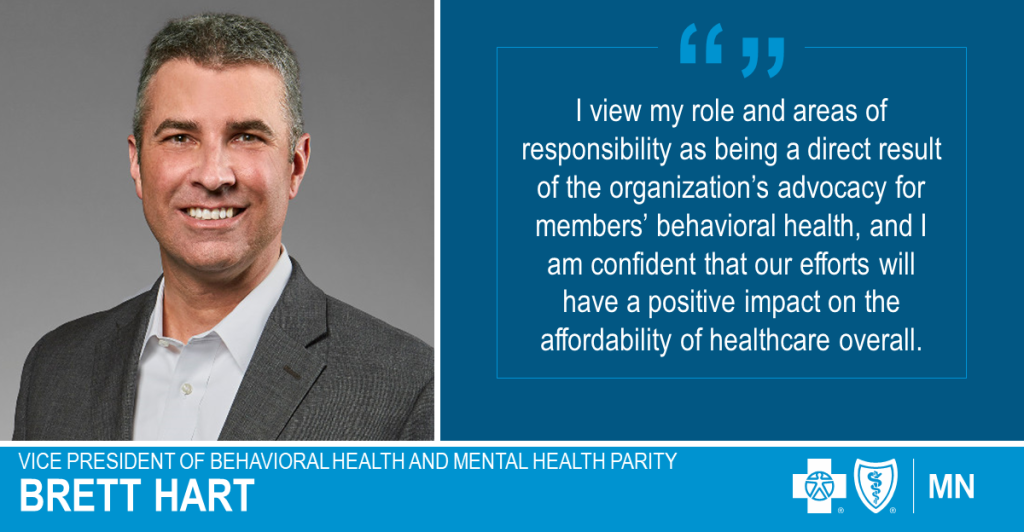Take 5: Get to know Blue Cross’ new behavioral health leader
March 5, 2024
"Take 5" is a series in which we pose five questions to a Blue Cross leader and learn more about who they are, what they do, and how they help our members live their healthiest lives.
This edition features Brett Hart, vice president of behavioral health and mental health parity. Brett joined Blue Cross in October 2023.
Key to know: According to the American Medical Association, “Behavioral health generally refers to mental health and substance use disorders, life stressors and crises, and stress-related physical symptoms. Behavioral health care refers to the prevention, diagnosis, and treatment of those conditions.”
What is unique to Blue Cross that made you interested in leading its behavioral health initiatives?
I was drawn to the mission: “We pave the way for everyone to achieve their healthiest life.” There are many companies who talk mission, but I have found Blue Cross to be a company that also lives it.
Another unique feature about Blue Cross is holistic thinking. Blue Cross thinks bigger and broader than other companies. Bringing Behavioral Health and Parity together into one structure is a notable example of that. It takes purposeful effort to break down siloes and bring together components that can lead to the whole being greater than the sum of its parts.
Finally, Blue Cross is all about the people. I have never worked with a more kind, supportive, and giving group of professionals. Everyone here understands that a win for our members, customers and providers is a win for Blue Cross. We understand the importance of aligning incentives and getting things done through productive relationships.
Behavioral health services are an important priority for Blue Cross. From your own point-of-view, why are they so critical?
Behavioral well-being and physical well-being are deeply interconnected. Neglecting the behavioral health component of a person leaves them more vulnerable across all other components of their health. We know, factually, that the overall health outcome for any population is worse when neglecting a behavioral health condition that may be present. So, addressing unmet behavioral health needs is about something larger: whole health.
How does behavioral health fit into Blue Cross’ efforts to increase member advocacy and make care more affordable?
Advocacy and affordability share behavioral health as the common denominator. We know that behavioral health is one of the top three areas of importance for our members and group customers. Helping them solve these issues through advocacy efforts can mitigate downstream pressures on both the healthcare system and their healthcare spending. It’s proven that physical health conditions cost three to six times more when accompanied by a behavioral health condition. I view my role and areas of responsibility as being a direct result of the organization’s advocacy for its members’ behavioral health, and I am confident that our efforts will have a positive impact on the affordability of healthcare overall.

What is a challenge that exists in the behavioral health space that readers can help with?
A persistent challenge is keeping behavioral health in the right focus and perspective. It’s very easy for people to minimize mental health needs as secondary to physical health. I’ve heard patients say, “I can’t worry about my mental health now, I’m dealing with lung cancer,” or, “I don’t have time for this, I’m giving birth in two weeks.” I would suggest an individual does not have time to not pay attention to behavioral health during times of anxiety and stress brought on by physical and medical issues. We can help others by reminding them of the importance of being behaviorally well and not waiting until things settle down in other areas of their lives.
What excites you most about the work you are leading?
I’m really excited about where Blue Cross wants to go regarding Behavioral Health, and more broadly, Behavioral Science. Regrettably, many think about Behavioral Health as being limited to things like counseling. While counseling is a critically important function, Behavioral Science goes well beyond it. Think about any challenge you are trying to solve in your area of work. Does any component of that solution involve people using thought, making choices, or taking a certain action? Welcome to the world of behavioral science! I believe we are just scratching the surface at Blue Cross when it comes to integrating behavioral science solutions that can advance care for our members and state-of-the-art solutions for our customers. That potential is extremely motivating for me.

